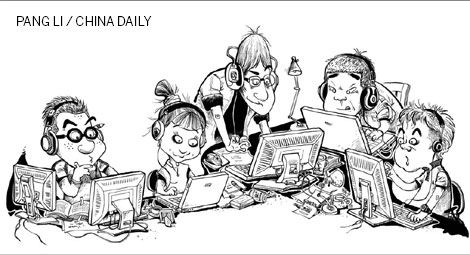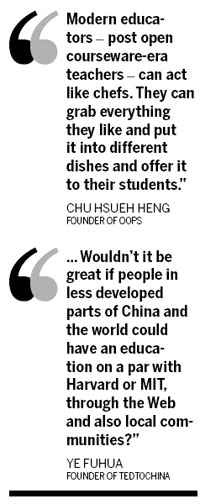Opening the doors to learning

Subtitling lectures from top universities in the United States and elsewhere means open courseware is available to all, Lulu Tsao reports
Yale professor Shelly Kagan doesn't speak Chinese, but thanks to online subtitling groups, thousands of Chinese students can now listen to Kagan's lectures. Over the past few months, China's top-ranked volunteer translation group, YYeTs, has subtitled 10 of Yale University's Open Courses for viewers to download for free, including Kagan's philosophy class on death.
Open courseware, which includes video lectures, assignments, and other materials from university classes, is available to anyone with an Internet connection. While people no longer have to be on campus to watch the lectures, a language barrier remains for non-English speakers.
Volunteer translation, or "crowdsourcing", is one solution that is increasingly popular in China, with Kagan's course receiving over 10,000 visitors per day.
Grateful viewers have applauded the translators for their dedication and hard work.
"This is a cause which will benefit mankind!" reads one online comment.
YYeTs has traditionally translated US TV shows like CSI and Gray's Anatomy, but Fang Si, an English editor who joined the group in 2008, explains that they started the Open Yale Courses project because so many of their users are students.
With this new project, the group is channeling its experience and passion for translating American entertainment.
"For us, it is a dream and a hobby. We can earn money through other ways, even translation work, but it doesn't give the same sense of achievement," Fang says.
YYeTs is one of a handful of subtitling groups working on online courses. The earliest volunteer group dedicated to translating courses into Chinese was the Opensource Opencourseware Prototype System (OOPS), based in Taiwan.
When Chu Hsueh Heng started OOPS in 2004, however, many academics believed that top-quality courses required professional translators.
"Almost all the academic guys out there said: 'You are ruining the whole idea of open courseware, the whole beautiful idea of higher education,' " he recalls.

Today the attitude of universities is very different, largely because the general public has welcomed volunteer translation for its speed, efficiency and quality of work. The subtitling groups have also developed their own ways of ensuring accuracy, including volunteer editors and proofreaders who have translation experience.
OOPS is now formally partnered with the Massachusetts Institute of Technology and has received recognition from schools like Johns Hopkins Bloomberg School of Public Health and Utah State University.
While Yale has not entered into any official partnerships, Professor Diana E.E. Kleiner, who directs Open Yale Courses, says the university is "very much in favor of partnering with institutions and delighted that volunteers have also emerged to support the translation effort".
Volunteer groups like OOPS are not only helping with translation, but also thinking about how open courseware can benefit educators.
OOPS is working with Chiao Tung University in Taiwan to make class-time more interactive by using open courseware. One physics professor asks students to watch his recorded lectures before class, so they can spend more time on asking questions and solving problems.
Chu believes that by sharing their best classes online, schools can learn from each other. In the past professors had to rely entirely on their own materials and approaches, but now they can access a wealth of resources and see how others are teaching.
"Modern educators - post open courseware-era teachers - can act like chefs. They can grab everything they like and put it into different dishes and offer it to their students," he says.
These online resources are not limited to university courses. Some of the most popular subtitled talks come from the annual TED - Technology, Entertainment, Design - conferences, featuring innovators like Steve Jobs, Bill Clinton and James Cameron.
While Ye Fuhua was a student at Sun Yat-sen University in Guangzhou, he started translating TED talks into Chinese and putting them online. In October 2008, Ye co-founded TEDtoChina with open source enthusiast Ding Jian in order to bring the ideas and format of TED to China.
"We knew there was something magical and significant with TED, and it is an idea that China really needs," Ye says.
Last year, TED launched an official Open Translation Project that relies on volunteers to subtitle talks. Over 600 talks have now been transcribed into simplified Chinese and over 300 into traditional Chinese.
For Ye, access to education is not just about overcoming language barriers but also socioeconomic and technological ones. He sees open translation as a way to move closer to quality education for all.
"In 10 or 20 years from now, computers will be very cheap, so wouldn't it be great if people in less developed parts of China and the world could have an education on a par with Harvard or MIT, through the Web and also local communities? I think that is a future that is both possible and practical, and that is also one of the dreams that I have," Ye says.
He is doing more than advancing his dream online. Ye now works with 1KG, a non-profit organization that aims to open source charity through microphilanthropy. In April, he helped 1KG organize a TED event at a rural school in the mountains of Yunnan province, four hours from downtown Lijiang. The presentations were designed to broaden children's perspectives, with topics like the story of the alphabet.
The experience opened Ye's eyes to the limitations faced by the students, some of whom were 16 but still in sixth grade. After the presentations, they were cheering.
Ye and many others in the volunteer translation community hope that in the future China will also export open educational resources.
In 2004, China started its own national version of open courseware called Chinese Quality Open Courseware. China Open Resources for Education (CORE), a consortium of universities, including Tsinghua and Peking University, is organizing the translation of representative Chinese courses into English.
While volunteers have translated written materials from classes like Modern Chinese Literature and Medical Diagnosis, there are no subtitled lecture videos available online. Lu Jian of CORE's partnerships office says that in the future they plan to provide them, but they do not yet have the necessary resources. CORE's current efforts focus on introducing open courseware from overseas.
"Translation projects like these need support from society," Lu says, "both in skills and funding."
While none of the volunteer translation groups are lacking in enthusiasm or energy, limited financial resources do make the future uncertain. Even so, they are determined to continue their work as long as possible.
"Simply by surviving it means the education market can tolerate a renegade like OOPS, and this is very meaningful and important," Chu Hsueh Heng says.
(China Daily 08/21/2010 page11)














